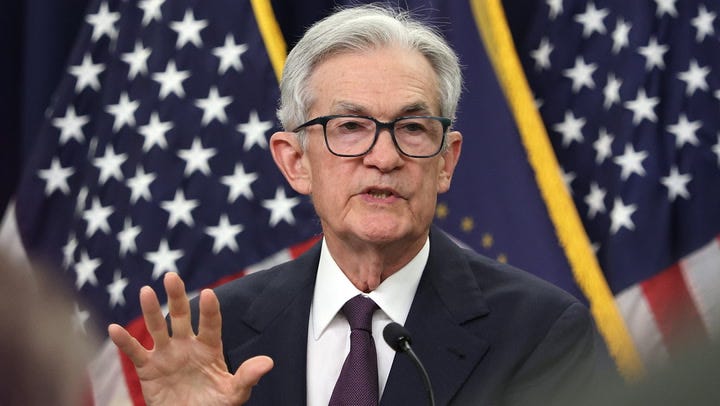Stocks close higher but shy of records on rate cut bets, hope for extended tariff deadline

U.S. stocks closed higher, but remained shy of new record highs despite bets lower rates will come soon and speculation President Donald Trump will extend his self-imposed trade deal deadline.
Trump’s July 8 and 9 deadlines for restarting tariffs are “not critical,” White House Press Secretary Karoline Leavitt told reporters. She said the president could extend those deadlines or set a tariff rate for countries who refuse to make a deal.
If Trump extends the deadline, it could delay the inflation hike many economists are predicting would come with high tariffs.
Separately, Trump's new aim at Federal Reserve Chairman Powell boosted bets for faster rate cuts. Traders now price in about a 21% chance of the Fed cutting rates in July, compared with about 12.5% last week, according to CME Group's FedWatch tool.
For months, Trump has berated Powell for holding interest rates steady. He's now considering selecting and announcing Powell's replacement early around September or October, or even this summer if Trump really gets fed up, the Wall Street Journal reported. An early announcement would allow the new pick to make policy and interest rate comments in the background and undermine Powell.
Lower interest rates make borrowing less expensive, which encourages companies and individuals to spend more and boost the economy.
The blue-chip Dow added 0.94%, or 404.41 points, to 43,386.84; the S&P 500 rose 0.8%, or 48.86 points, to 6,141.02. The Nasdaq gained 0.97%, or 194.36 points, to 20,167.91. The benchmark 10-year Treasury yield fell to 4.242%.
Powell reiterated his wait-and-see approach to interest rates in testimony to Congress this week. He stuck to his script, saying he wanted to wait to see the effects of tariffs on inflation, the economy and the labor market before making any interest rate decisions.
Before the bell, weekly initial jobless claims data showed fewer people than expected filing for unemployment benefits. However, recurring claims -- an indication of how long people are remaining unemployed and receiving benefits -- jumped to the highest since November 2021.
Meanwhile. gross domestic product (GDP) for the first three months of the year fell 0.5%, due to an increase in imports, which are a subtraction in the calculation of GDP, and a decrease in government spending, the Bureau of Economic Analysis said. These were partly offset by increases in investment and consumer spending, it said.
Economists say the GDP figures were skewed by the surge in imports to front run Trump's tariffs. They don't expect that to happen again in the second quarter so GDP should bounce back.
The government previously estimated the economy shrank 0.2% in the first three months.
"The takeaway from this morning’s mixed data is that the economy is slowing, but remains resilient," said Chris Larkin, managing director, trading and investing, at E*TRADE from Morgan Stanley.
More inflation data ahead
Powell, known for being data-dependent for his interest rate decisions, will get more of it, including inflation data, at the end of the week.
The Fed's preferred gauge of inflation is expected to have risen 2.3% in May on an annual basis, with the core rate excluding food and energy up 2.6%. Most economists expect those numbers to continue rising this summer.
Along with inflation data, investors will also get a glimpse of consumer spending through personal consumption expenditures, or PCE, data. Consumer spending makes up roughly two-thirds of economic activity.
One Big Beautiful Bill watch
Investors are also watching developments surrounding the One Big Beautiful Bill circulating around the Hill.
Though the House and Senate are still discussing revisions, most corporate chief financial officers are confident the bill will be passed by Congress and preserve key business tax cuts, according to the second-quarter CNBC CFO Council Survey.
Trump continues calling for the mega tax bill to get passed by July 4.
Corporate news
- Micron's results topped analysts' forecasts in the third fiscal quarter. The maker of memory and storage products also issued guidance for the last three months of its fiscal year that was above expectations. Shares fell nearly 1%.
- H.B. Fuller topped estimates for the latest quarter and issued a strong full-year outlook. Share jumped almost 11%.
- Kratos Defense & Security Solutions plans to sell $500 million of its common stock in an underwritten public offering. Shares dropped 2.36%.
- Investment bank Jefferies' quarterly results missed analysts' forecasts. Shares edged up.
- Drug store chain Walgreens' quarterly results beat forecasts. Shares closed fractionally higher.
- Spice maker McCormick topped analysts' forecasts for quarterly results and said it could manage higher tariffs. Shares rose 5.31%.
- Equinix's annual growth forecast disappointed investors. Shares fell 9.53%.
- CoreWeave is in talks to buy Core Scientific, after the bitcoin miner rejected an earlier deal from the cloud provider last year, said the Wall Street Journal, citing sources. Core Scientific shares soared 33%.
- Bank stocks performed well after the Fed unveiled a proposal to relax its leverage rules, which would ease the capital big banks are required to hold against relatively low-risk assets. The plan would free up money to earn interest on.
Cryptocurrency
The Federal Housing Finance Agency ordered Fannie Mae and Freddie Mac to formally consider cryptocurrency as an asset in single-family mortgage loan risk assessments. The housing finance companies must develop proposals that include digital assets, without requiring borrowers to liquidate them into U.S. dollars prior to a loan closing.
Bitcoin was last up 0.31% at $107,679.20.
(This story was updated with new information.)
Medora Lee is a money, markets, and personal finance reporter at Paste BN. You can reach her at mjlee@usatoday.com and subscribe to our free Daily Money newsletter for personal finance tips and business news every Monday through Friday.